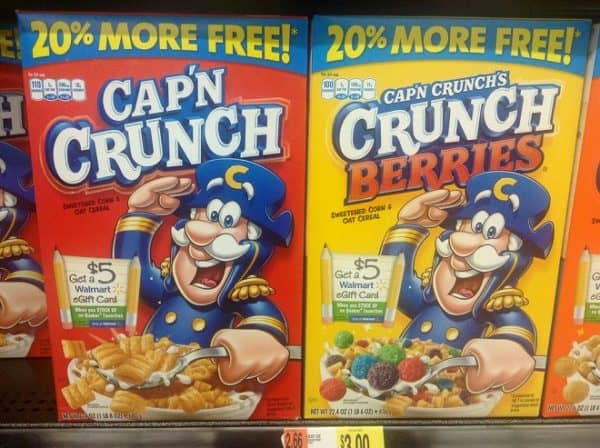Unhealthy breakfast cereals get five times the shelf space of healthy ones, study finds

 A new study from the University of Ottawa has found that sugar-filled unhealthy breakfast cereals aimed at children get centre stage in Canadian supermarkets over more healthy alternatives.
A new study from the University of Ottawa has found that sugar-filled unhealthy breakfast cereals aimed at children get centre stage in Canadian supermarkets over more healthy alternatives.
The research concluded that unhealthy cereals got 5.3 times the shelf space compared to healthy cereals and were more frequently displayed at eye level in middle shelving along the aisles. Researchers say the results speak to the need for supermarkets to change their in-store marketing strategies to be more in line with public health recommendations on promoting healthier food products.
The food fight across Canada has been ramping up as of late. Health Canada is in the midst of revamping Canada’s Food Guide, with an early draft sparking debate over the downplaying of animal meats and dairy in favour of vegetables, fruit and whole grains.
On the food labeling front, the lines are being drawn as federal departments have begun talks with public health advocates and food industry representatives over proposed changes, ones which could see mandatory labels over and above nutritional content listings which would indicate if a product contains more than 15 per cent of the recommended daily amounts of sugar, salt or fat.
Health advocates say that labelling matters, since food marketing is known to have a heavy influence on people’s choices and, ultimately, their dietary habits. But supermarkets have a role to play, too. Across Canada, a full 73 per cent of food expenditures are made in grocery, specialty food, warehouse and convenience-type stores and studies have shown that two-thirds of people’s purchase decisions are made while wandering the aisles. Thus, the in-store placement of food items, where many stores have over 40,000 options, as well as in-store promotions are strongly impactful on the kinds of foods we buy and consume.
The new study published in the journal BMC Public Health looked at store displays for breakfast cereals in five grocery stores (Loblaws, Sobeys, Metro, Costco and Wal-Mart) in the Ottawa-Gatineau area over a three-week period, recording shelf location, number of shelf facings, whether the cereal was featured mid-aisle or end cap and whether any promotional features were related to the product.
The researchers put the cereals into two camps, healthier or less healthy, by paring product information to a Nutrient Profiling Model developed in the United Kingdom as a tool for assessing whether or not certain foods should be marketed on television towards children.
By that standard, of the 225 types of breakfast cereal found on store shelves, a full 70.2 per cent (158 cereals) were classified as less healthy and 29.8 per cent (67 cereals) healthier.
In terms of store displays, the less healthy cereals were displayed at eye level and on the more profitable middle shelves w.9 more often than the healthier ones, took up 5.3 times more shelf facings and 4.2 times more end cap displays. The less healthy options also had 3.3 more special pricing signage than the healthier ones.
The researchers say their finding show that supermarkets need to be more considerate of the healthfulness of their products when devising display strategies. “At Costco, only one healthier breakfast cereal was available on their shelves compared to 13 less healthy cereals while at Walmart there were 4.3 less healthy cereals for every healthier cereal,” say the study’s authors, from the School of Epidemiology and Public Health and the Interdisciplinary School of Health Sciences at the University of Ottawa.
“Moving healthier cereals to the middle shelf at eye level will make customers notice these cereals and increase the likelihood that they will be purchased,” say the authors. “Increasing the number of healthier cereals in promotional locations such as end-cap and mid-aisle displays is also recommended to make the cereals more visible.”

